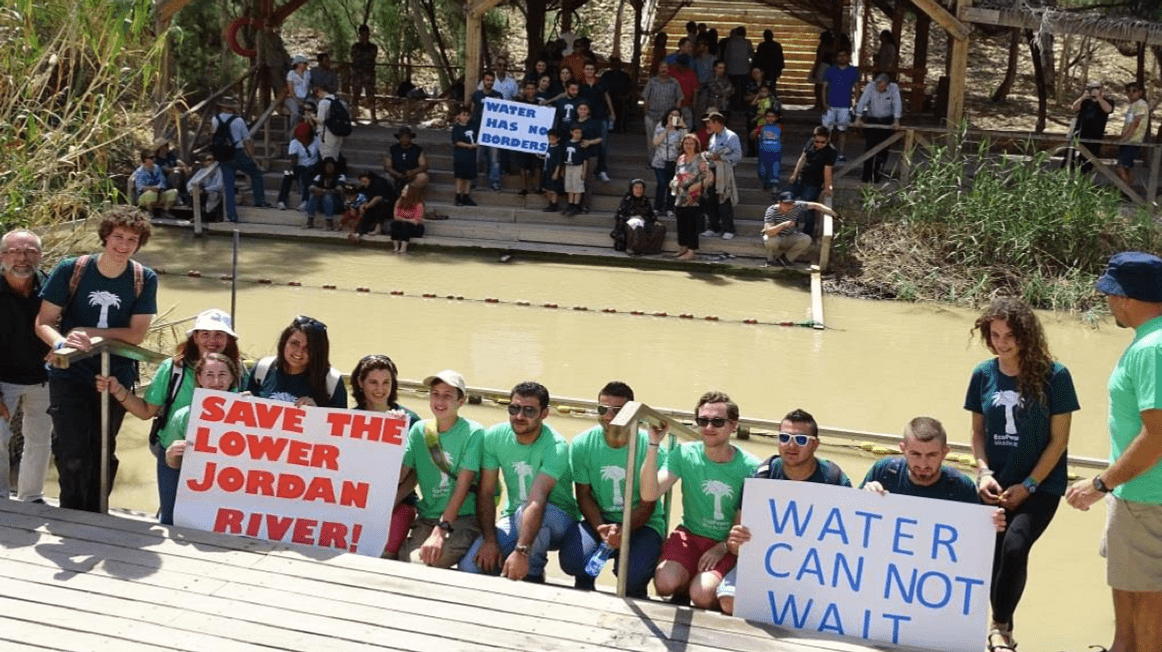Celebrating Earth Day at 50:
EcoPeace Middle East – at the Intersection of Sustainability and Peacemaking
by Gidon Bromberg
Founded in 1994, EcoPeace Middle East is a unique regional organization with offices in Amman, Ramallah, and Tel Aviv that brings together Jordanian, Palestinian, and Israeli environmentalists to work together to protect our shared environment. An award-winning trailblazer in the field of environmental peacebuilding, EcoPeace seeks to advance sustainable development while creating the necessary conditions for lasting peace in the region.
EcoPeace’s staff work as teams of three, with department members from Israel, Jordan, and Palestine. This collaborative model ensures that each area’s perspective is accounted for. Most of the work is performed locally, but regional programs and planning meetings take place as well.
EcoPeace’s distinctive approach combines both top-down advocacy for policy change and bottom-up community-based constituency building. EcoPeace’s bottom-up programing focuses on educating youth and local constituencies to call for and lead cross-border solutions that both address regional water issues and advance community interests. We are currently developing and scaling up innovative programs on a regional and global basis and working directly with local stakeholders in cross-border watersheds through town hall meetings, local steering committees, and cooperative projects.
EcoPeace’s top-down activities show decision-makers that it is not possible to disengage from a shared environment, and highlight the national self-interests and mutual gain derived from cooperation. Current top-down activities prioritize securing a new agreement on Israeli-Palestinian natural water allocation and management, advancing trilateral cooperation for development in the Jordan Valley, and advancing a water-energy nexus approach to create and sustain regional cooperation. This includes activities to secure investments in high-impact Water, Sanitation and Hygiene projects throughout the region, and developing greater organizational capacities to encourage the private sector, international finance institutions, and the international donor community to invest in projects that address regional water and environmental problems. At the same time, EcoPeace encourages political decision-makers and water and energy authorities to create an enabling environment for public-private sector investments in these projects.
EcoPeace’s Main Programs
Good Water Neighbors: Initiated in 2001, Good Water Neighbors is EcoPeace’s flagship program for community-based environmental peacebuilding. It engages young Palestinians, Israelis, and Jordanians in learning about and becoming part of a solution-oriented regional approach that acknowledges the interdependent nature of both water resources and environmental impact and stresses the need for cooperation to solve regional water and environmental issues.
Rehabilitating the Jordan Valley: The Jordan River has seen some 95 percent of its fresh water diverted, much of its flow polluted, and its biodiversity lost. Together with the actions of mineral extraction companies in Israel and Jordan, this has led to the dramatic destruction of the Dead Sea into which the Jordan River flows. The ecologic demise of the Jordan Valley basin is accompanied by high levels of poverty and unemployment there, creating fertile ground for social unrest and extremism. In a four-year participatory process, EcoPeace has developed a first-of-its-kind integrated Jordanian-Israeli-Palestinian masterplan to rehabilitate the ecologic, economic, and social health of the Jordan River basin; the plan is currently being advanced among decision-makers and investors. On the community level, EcoPeace works with Jordan Valley communities and wastewater treatment plants to improve water efficiency and reduce pollution by improving wastewater collection and reuse.
Water Cannot Wait (the Hebron-Negev-Gaza Watershed): The water crisis in Gaza, water scarcity in the West Bank, and the high level of water pollution crossing the border remind us that water allocation and management issues can no longer be held hostage to other final-status issues in the Israeli-Palestinian peace process. This understanding is what drives EcoPeace’s “Water Cannot Wait” project. Israel’s wide-scale desalination means that the reallocation of natural water can today be negotiated at low political cost to the country. New water agreements and improved water management could create concrete improvement of water security and livelihood for both Israelis and Palestinians and could help rebuild the public’s trust and belief in the future success of the peace process.
The Water Energy Nexus initiative is an ambitious program that seeks to advance the creation of an Israel-Palestine-Jordan Water-Energy Community. Such a community would involve surplus renewable energy from Jordan being exchanged for desalinated water from Israel’s Mediterranean coast and from Gaza, thereby creating healthy resource interdependencies that would augment regional stability.
The Program on Water Security connects EcoPeace’s environmental peacebuilding experience and methodology with the capacity-building needs of civil society organizations worldwide coping with water stress and conflict. The program provides opportunities for global networking and partnership, technical assistance, strategic planning, and training on organizing grassroots and advocacy activities. Last year alone we shared our methodologies with civil society organizations in the Lake Chad Basin, North Africa, and the Rift Valley.
In addition to our regular programs, EcoPeace is very active internationally, working hard to spread our message of cooperation throughout the world. In 2019, we presented before the United Nations Security Council and UN Climate Summit in New York City, at the Munich Security conference and NATO, to the World Bank, at the Vatican, and before some of the world’s leading think tanks, including the US Institute for Peace and the Clingendael Institute in the Netherlands. We were also quoted in the New York Times, appeared on the BBC, featured in the Doha Debates, and covered extensively by local media.
The work of EcoPeace has never been more influential. We are sought after as a strategic partner, able to influence policymakers, and inspire and educate the public through our creative programs.
——–

Gidon Bromberg is the Israeli Co-Director of EcoPeace Middle East, a regional Israeli, Palestinian, Jordanian, organization dedicated to water diplomacy and environmental peacemaking efforts.
Click here to meet EcoPeace Middle East Israeli Co-Director, Gidon Bromberg, in a wonderful, upbeat five-minute interview.







Leave A Comment